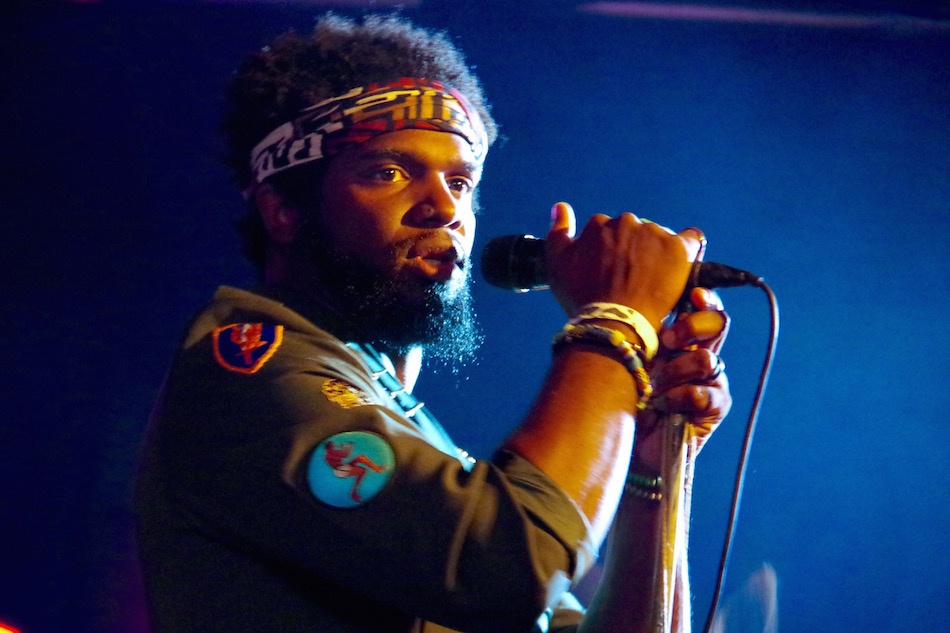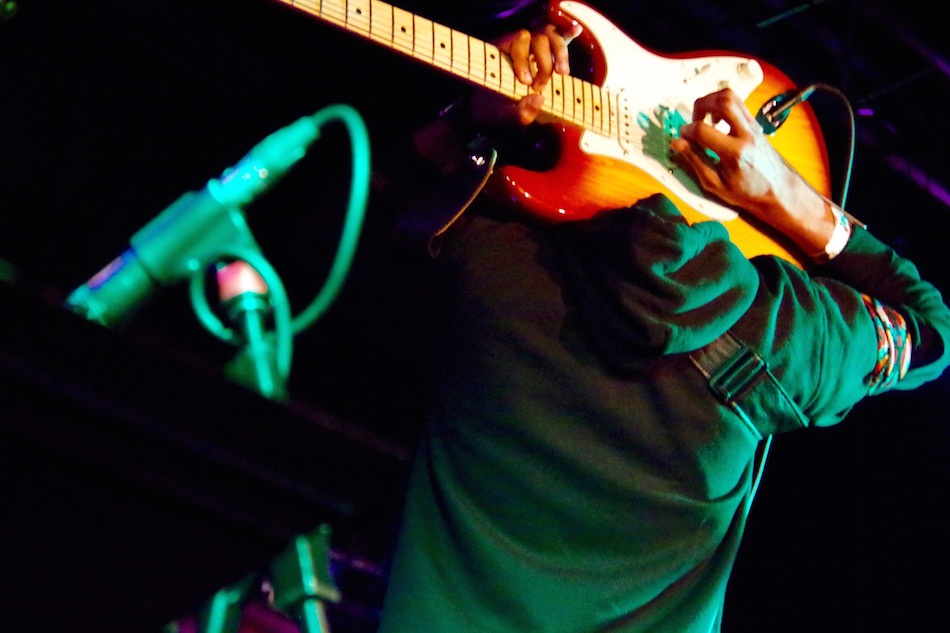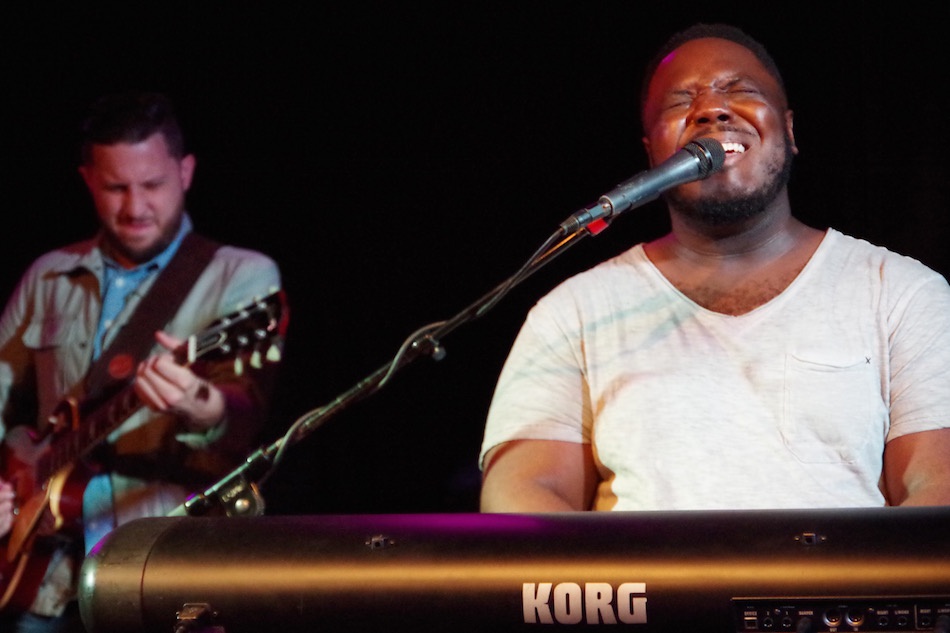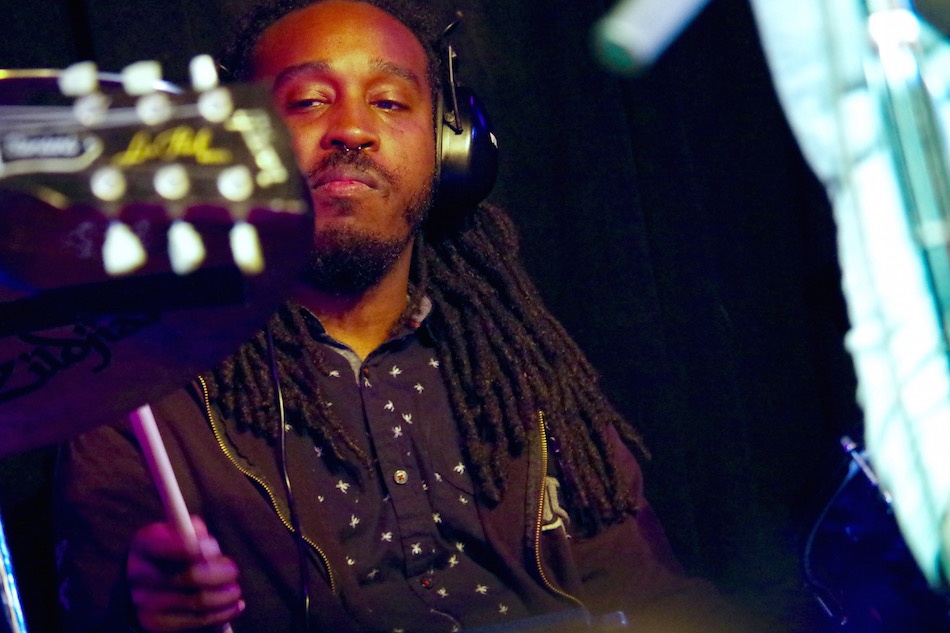J.P. Reynolds rocked at his hips, shoulders getting in on the action. He began to sink into his knees, soaked in light that changed from yellow to pink to green back to yellow again. His right hand flattened out and bounced at his side. Then, without warning, he kicked the air, stepped back, and kept going.
In shadow at stage left, Gabrielle Murphy, Lessie Vonner, and Kalia Vandever laid down a thick, throaty brass melody, rocking from side to side in unison. Members of the crowd followed their movement, faces catching in the light. On long notes, the slide on Vandever’s trombone pushed out past the stage, within striking distance of the audience.

Reynolds. Lucy Gellman Photos.
Friday night, Reynolds bought those stylings to Hamden’s Outer Space, transforming the venue into an intimate study in hip-hop, youth empowerment, and spiritual resilience. Accompanied by members of Peace & Power Media, the New York based artist spun his craft into fast-flying lyrics, untethered dance, and a baptism by music that had the audience at its feet by the end of the evening.
Reynolds isn’t new to New Haven: He attended Yale as an undergraduate and then stayed on for Divinity School, moving to New York in 2012. There, he founded Peace & Power Media, which is dedicated to celebrating, connecting and promoting artists of color. In 2015, he started working for The Future Project, adding education to his resume. Friday night, he said, signaled a sort of brief homecoming, a chance to come back and bless a space just briefly before heading back to New York.
“We’re gonna have a guavalicious time,” Reynolds said as he introduced members of the band—Criston Oates on bass, Jayare McKenzie on drums, Sidney Antoine and Mike Rodriguez on guitar, Duvane Whilby on keyboards, Murphy on sax, Lessie Vonner on trumpet, and Vandever on trombone. He looked out into the crowd, a red and yellow print bandana catching sweat that was already trickling down.
“Guava is a call to rise—to re-access power that we have,” he said. A puff of blue smoke billowed out past him, turning things a deep ghostly blue. For a moment, the stage smelled of chalk. “We need that power back.”
He paced around the microphone, still for only a moment as he looked out on the space, where his father sat at a table in the back of the room. On stage, Jayare McKenzie started in with a drum beat. Reynolds lifted the mic from its stand, the long black cord trailing with him.
“Peace and power is my dream team!” he began, pushing his chest out. Under a green jacket, the white Peace & Power logo bobbed with his breathing. “Peace and power is my dream team.”
Around him, the band came to life, a fusion of keys and drums, brass and bass spilling over the lip of the stage. Vonnerand Murphy marched in place, completely in sync as they pushed out a baa baaa baaah and long beau under Reynolds’ vocals. As McKenzie worked furiously from drum to cymbal, drum to cymbal, Reynolds segued into a piece on his spiritual gratitude, “Thanking the Lord I got bread.”

Everybody tryna survive and stay alive
People be like where is the God in a 9-5
What you gon do?
In the hood they be shooting
Drugs a problem too
In the burbs they be shooting
Up
And we're battling upstream
And I be looking crazy when I begin to sing
The band wailed on as he rocked back and forth, then began to circle a small section at the front of the stage. As the song wound down, he ushered the audience onto its feet.
“When I say peace, you say power,” he yelled. “Peace!”
“Powerrrrrr!” the audience shouted back. Attendees filled the floor in front of the stage, swaying with the music. At the front, Elm City Vineyard Pastor Josh Williams crouched low to the ground and worked his way back up, his wife (and fellow worship pastor at the church) Tina bobbing alongside him. A la Jimi Hendrix, Mike Rodriguez hoisted his guitar over his shoulders, inverted it in less than five seconds, and continued to play as it sat on his upper back. As the audience cheered, he flipped it back over his head, walked up to the front of the stage, and lowered his mouth to the instrument.
“I feel great,” Reynolds said after the performance. “Musicians have the power to be griots and prophets and I take that seriously … in terms of being a vessel and being a conduit for that type of power. The more people hear it, I feel like they can experience that power with me—and they can take some action too.”
“I ultimately want people to leave feeling confident in who they are, who they’re called to be, how we can connect with people and have radical conversations,” he added. “To think about things in a different way, to shift some heart-space, mind-space things.”

That move toward empowerment and self-celebration began not just with Reynolds, but opener Paul Bryant Hudson. A born and bred New Havener, Hudson arrived with musicians Stephen King, Pete Greco, Max Spinell and Travis Hall, ready to perform.
But he started with a cover. As conversations hushed with a flourish of piano notes, slowed-down verses from Bob Marley’s “Redemption Song” coasted over the crowd.
Emancipate yourselves from mental slavery/None but ourselves can free our minds, he crooned, the song his own by the time it pushed through his lungs to the air. How long shall they kill our prophets/While we stand aside and look?

Marley led Hudson and his band into a set that traversed community engagement to racial parity. After slowing down with a deeply moving tribute to John Henry that he had written—soulful, lung-filled wails and soft refrains, like something for a celebration of one’s life—he roused the room with a cover of Bill Withers’ “Lovely Day.” Then he prepared to get personal.
“I’ve been dealing with this stereotype of the big black man in the workplace,” he said before launching into “Black Parade.” Around him, audience members leaned in to listen to the words.
Woooaaahhh feel my rage, he sang, throwing his head back and opening his mouth side as he sang. Oooohhhh it’s the black parade.
Behind him, Greco started the band on a round of solos, Hall quieting on the drums until they were just a soft pum pum pum rumm pum in the background.
Around them, the space seemed to shrink, from the cavernous room to a small salon or church sanctuary, where the group was at capacity. Their applause, punctuating with whoops and snaps, filled the room.